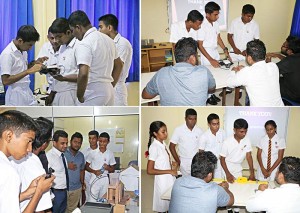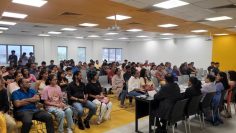
ComBank’s project for computer coding in schools off to a great start
A project to teach school children computer programming has had an encouraging start, with students of a rural school demonstrating their skills by developing innovative and useful applications in just three months, the project’s promoter, the Commercial Bank of Ceylon reports.
Students of the Rajasinghe Vidyalaya, Hanwella participated in a foundation course in computer programming under a pilot project in coding presented by the Commercial Bank in collaboration with the STEMUp Education Foundation.
The course was conducted with the help of BBC micro:bit, a pocket-sized codeable computer with motion detection, a built-in compass and Bluetooth technology, which allows students to express themselves digitally.
STEMUp Foundation organised a coding competition during the course, encouraging students of the school to create coded, real-world applications in groups. A panel of judges consisting of IT undergraduates of the Moratuwa University assessed the products of the five groups that competed and selected winners on the basis of innovative thought and usability of the applications.
The winning group created an automated system to water plants. In this system, the sensors in the micro:bit gauge the dryness of soil and send a signal to a water tank. Upon receiving the signal, the tank supplies water to plants and stops the flow once the required quantity is absorbed by the soil. The students will apply this technology to the greenhouse in the school, shortly.
The group placed second turned the micro:bit into a temperature reader which sensesa potential threat of fire. If a building is about to catch fire or is on fire, this device indicates the actual temperature of the place, enabling firefighters to accurately assess the situation. It will also suggest methods to douse the fire, including usage of drones, helicopters, or high-pressure water cannons, depending on the type of fire.
Other products created by the teams included a control system which can be fixed to overhead water tanks to regulate water level and prevent overflowing; a white stick equipped with a micro:bit device which produces a buzzing signal that alerts a visually-handicapped person using the stick to objects that lie within one meter; and a home security system in which the micro:bit immediately identifies the presence of a trespasser and sends a vibratory signal to the digital device of the owner.
Applauding the innovation of the students and the marketable value of these products, the judges presented constructive suggestions that could improve their usability and functions.The awards to the winning groups were presented by representatives of Commercial Bank and the judges.
Launched in November last year with the objectives of increasing computer programming capabilities of students and to encourage critical thinking, the project was part of Commercial Bank’s Corporate Social Responsibility agenda. Following its successful completion in February, the Bank said it plans to extend the programme to other schools as well.
According to educators, learning coding can also help students learn to be more persistent, acquire problem-solving skills, attempt new things, practice math skills, deconstruct complex problems into manageable parts and solve them gradually, develop communication through software applications, while increasing their opportunities in the job market.
Conceived by BBC learning in 2012 and initially developed together with BBC’s award-winning R&D department, the micro:bit is BBC’s most ambitious education initiative in 30 years, with an ambition to inspire digital creativity and develop a new generation of tech pioneers. Measuring just four centimetres by five centimetres, it can be coded with something simple in seconds; like lighting up its LEDs or displaying a pattern – with no prior knowledge of computing. It also connects to other devices, sensors, kits and objects, and is a companion to Arduino, Galileo, Kano, littleBits and Raspberry Pi, acting as a springboard to more complex learning.
The STEMUp Foundation is a non-governmental organisation whose mission is to inspire and engage students to become interested in pursuing Scientific, Technological, Engineering, and Mathematical (STEM) degrees and careers. Consisting of young volunteers from professional organisations and universities, it seeks to increase computer programming capabilities and empower every child in Sri Lanka.
Under its education-related Corporate Social Responsibility initiatives, which place emphasis on IT literacy, the Commercial Bank of Ceylon has donated 180 IT Labs to schools and other institutions and is a partner in the government – private sector ‘Smart Schools’ project currently encompassing 65 schools in the Western Province. The Bank has made substantial investments to develop the curriculum for all age groups for this programme and has also developed an online learning portal called Sipnena to benefit students.
Commercial Bank is also funding a 150-hour IT hardware course conducted in collaboration with SLT Campus (Pvt) Ltd. and Cisco Networking Academy as a pilot project in selected schools and has partnered with Cisco Networking Academy to offer an ‘IT Essentials’ course for teachers and students free of charge. Additionally, the Bank has supported the ‘IT Essentials-Instructor’ certificate course for teachers at the Cisco Networking Centre at the University of Moratuwa under this programme.
The only Sri Lankan Bank to be ranked among the world’s top 1000 banks for eight years consecutively, Commercial Bank operates a network of 266 branches and 830 ATMs in Sri Lanka. The Bank has won multiple international and local awards in 2016 and 2017 and over 40 international and local awards in 2018.







